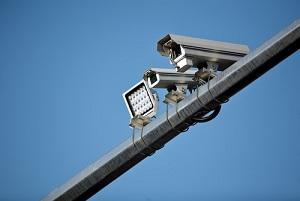 While you have probably seen them on utility poles, overpasses, or mounted on the outside of police cruisers, they are probably not what you think. They appear to be cameras, and in today’s world, that would not be all that unusual. But, they are not regular surveillance cameras recording video for what most would consider “normal” security purposes. Instead, they are aimed in such a way that they can read the license plate of every passing vehicle, up to tens of thousands per hour, recording each plate and, according to law enforcement officials, assisting in the tracking of criminal suspects and stolen vehicles. There is growing concern, however, regarding the use of automatic license plate readers, and, perhaps more importantly, how the data they collect is stored and used to track innocent people without their knowledge.
While you have probably seen them on utility poles, overpasses, or mounted on the outside of police cruisers, they are probably not what you think. They appear to be cameras, and in today’s world, that would not be all that unusual. But, they are not regular surveillance cameras recording video for what most would consider “normal” security purposes. Instead, they are aimed in such a way that they can read the license plate of every passing vehicle, up to tens of thousands per hour, recording each plate and, according to law enforcement officials, assisting in the tracking of criminal suspects and stolen vehicles. There is growing concern, however, regarding the use of automatic license plate readers, and, perhaps more importantly, how the data they collect is stored and used to track innocent people without their knowledge.
Law Enforcement Applications
It is fairly easy to see why police departments would be interested in using license plate readers to help collect data on the cars and trucks that pass under them on a given day. Every time a vehicle’s plate is captured by a license plate reader, the image is stamped with the date, time, and location, and the plate number, along with all of the metadata is stored in a database. The database will generally include all of the scans from the entire network of license plate readers for that particular jurisdiction. Police can then search the database for a particular plate number, when needed, and pull up all of the various times and locations at which the plate was recorded.
The overarching concern, however, is that while tracking a criminal or wanted individual is a valid application of the technology, it means that law enforcement agencies are also storing millions of records about innocent drivers. The American Civil Liberties Union (ACLU) has been very outspoken in its criticism of using the readers to create permanent records that could track virtually every driver in the country. “The tracking of people’s location constitutes a significant invasion of privacy, which can reveal many things about their lives, such as what friends, doctors, protests, political events, or churches a person may visit,” the ACLU maintains. Creating a repository of information just in case somebody breaks the law is not a valid justification for mass routine location tracking and surveillance, according to the organization.
Increasing Private Uses
License plate reader technology is also increasing being used by private companies, most commonly owners of parking garages and repossession companies working on behalf of auto finance companies. While garage owners simply record vehicles going in and out, potentially keeping track of paying customers, repossession companies are more likely to target low-income neighborhoods looking for vehicles that are behind on payments or in default, according to a Boston Globe report. Once again, while the companies may have a logical reason for wanting the information, collecting the data of other, unrelated vehicles is a major cause for concern.
Resulting Criminal Charges
If you have been charged with a crime based on information collected by an automatic license plate reader, contact an experienced Hartford criminal defense attorney. When your rights to privacy have been compromised, you need a lawyer who is willing to fight on your behalf. Call 860-290-8690 today to schedule a confidential consultation at the Woolf & Ross Law Firm, LLC.
Sources:
http://www.theatlantic.com/technology/archive/2016/04/how-license-plate-readers-have-helped-police-and-lenders-target-the-poor/479436/
https://www.aclu.org/feature/you-are-being-tracked
 50 Founders Plaza
50 Founders Plaza

